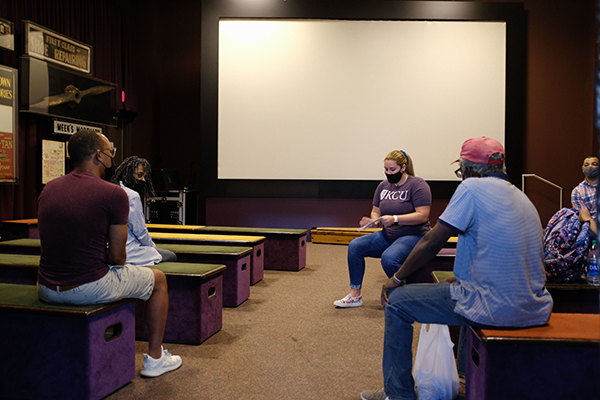As the COVID-19 pandemic continues to ravage our country, low vaccination rates, particularly within communities of color, have resulted in a dramatic influx of hospitalizations and deaths since the surge of the highly transmissible Delta variant. In an effort to address the vaccination disparity, KCU recently teamed up with Black Health Care Coalition (BHCC), Kansas City Health Department, and Samuel U. Rodgers Health Center to host a series of weekly vaccine clinics at Gregg Klice Community Center. The collaborative effort kicked off Saturday, August 30 and continues through Saturday, October 9.
 Listening tours focused on vaccine hesitancy are taking place in conjunction with the clinics. The listening tours provide a forum for public comment to promote open, transparent communication and build community trust. Faculty and students in the College of Biosciences Doctorate of Clinical Psychology program conduct the sessions to better understand the concerns that lead to vaccine hesitancy.
Listening tours focused on vaccine hesitancy are taking place in conjunction with the clinics. The listening tours provide a forum for public comment to promote open, transparent communication and build community trust. Faculty and students in the College of Biosciences Doctorate of Clinical Psychology program conduct the sessions to better understand the concerns that lead to vaccine hesitancy.
“Unfortunately, science and medicine have a less than stellar history with communities of color. Mistreatment and medical experimentation have resulted in a climate of mistrusting the medical community. Further, politics and a wave of misinformation have created additional reasons for many groups to distrust the vaccine,” says KCU Program Director of Health Services Psychology and Assistant Provost for Accreditation Sarah Getch, PhD. “During listening sessions, we ask five open-ended questions focusing on vaccine hesitations, what the organization or community can do about it, what community members know about scientific research regarding how the vaccines were created, where people feel safe receiving a vaccine, and what kind of motivation they have for getting it.”
KCU PsyD students have a vested interest in supporting the community and especially communities of color. “All of us at KCU are excited to see our PsyD students build relationships throughout the Kansas City area by listening to the concerns some have about the vaccine, meeting folks where they are at, and leaning on influential community members to share accurate information,” adds Getch.
Answers and results of the surveys are transcribed, analyzed, and reported to participants and the BHCC so that concerns can be addressed through targeted educational sessions and materials as well as open question and answer sessions with an expert. As questions are addressed, community members may decide to receive the vaccine at one of the many clinics throughout the region where KCU medical students are volunteering as vaccinators. We want to listen to community concerns and provide accurate information. Ultimately, we hope people will choose to get vaccinated. KCU stands ready to assist on all fronts.



(0) Comments